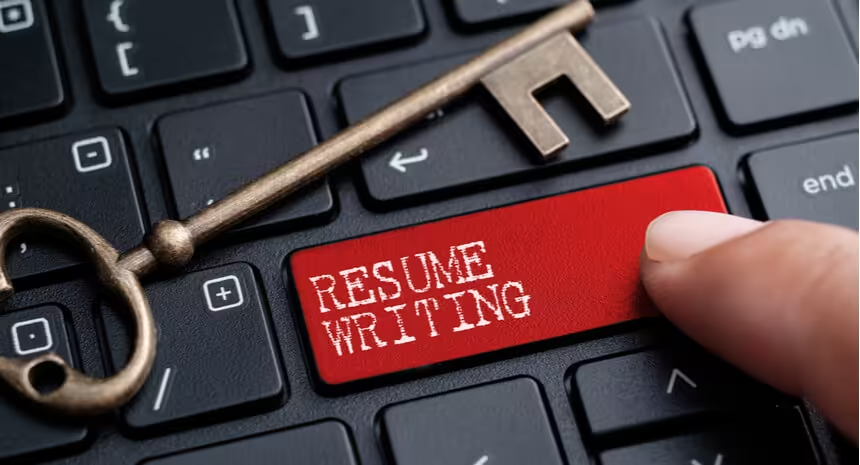Table of contents
- What Is a Phone Interview?
- What Employers Look for in a Phone Interview
- How to Prepare for a Phone Interview
- Research the Company & Role
- Setting & Environment
- Practice Common Phone Interview Questions
- Take Notes & Have Key Information Ready
- Dress the Part
- Phone Interview Etiquette
- Follow Up
- Common Phone Interview Mistakes
- Key Takeaways
- FAQ
Phone interviews are essential to the hiring process, often serving as the first step in screening candidates.
Employers look to assess your qualifications and determine if you’re a good fit for the role before moving on to in-person or video interviews. Understanding this and knowing how to prepare for the phone interview is important in presenting your best self.
With our help, this guide will show you:
- What employers look for in a phone interview.
- The basic format of a phone screen.
- Phone interview tips on what to do before, during, and after your call.
- Key mistakes to avoid.
Every phone interview requires a resume. Use our AI Resume Builder to write your resume quickly. Simply upload your old resume or start a new one, select your favorite template and tell us your job title. Then, we’ll generate content suggestions you can add to your resume with one click!
What Is a Phone Interview?
A phone interview, also known as a phone screen interview, is often your first formal interaction with a potential employer.
Typically lasting 15-30 minutes, it’s usually conducted by a recruiter or hiring manager to screen candidates quickly.
A phone interview typically focuses on:
- Skills and experience: Questions about your previous work experience and relevant skills.
- Company knowledge: Understanding of the company and its role in your career goals.
- Interest in the role: Your enthusiasm and motivation for applying to the specific job.
Understanding the phone interview process helps you know what to expect and how to prepare your responses, so you can make a strong impression even without face-to-face interaction.
What Employers Look for in a Phone Interview
You may ask yourself, what’s the point of a phone interview? Eager to get your next job, you may be forgiven for assuming the recruiter or hiring manager would set up a regular interview if they want to speak with you.
However, consider all the other applicants your employer may have to filter through. The initial sorting is usually performed by an applicant tracking system (ATS), which scans resumes for specific qualifications and keywords, sending only the most relevant applications forward.
From here, the recruiter or hiring manager needs to pick out the best candidates on paper, but therein lies the rub. Resumes and cover letters can only tell so much about a potential employee.
Employers use a phone screen interview to assess the applicant and see if they are worth further consideration.
A phone screen interview is an opportunity to test the applicant’s soft skills and see if they have the interpersonal skills of basic communication and professionalism. Additionally, it allows the recruiter or hiring manager to ask questions about the applicant’s qualifications and gauge their answers accordingly.
If the candidate cannot answer basic questions or even conduct a phone interview, it saves the employer the hassle of bringing them in.
How to Prepare for a Phone Interview
Now that you know what employers are looking for in a phone interview, you can better prepare for it.
Good preparation increases your chances of getting through the screening process and in-person interviews.
There are five key points you will want to consider when getting ready:
Research the company and role.
Choose an appropriate environment.
Practice common phone interview questions.
Take notes.
Dress appropriately.
Let’s explore each one of these in more detail so you can see just what you need to do to succeed.
Research the Company & Role
Researching the company and the role you’re applying for is crucial when preparing for a phone screen interview. This allows you to align your responses with the company’s values and the job’s requirements, demonstrating your genuine interest and fit for the position.
What to consider when researching:
- Review the company’s mission, values, and products or services.
- Check out any recent news articles, press releases or blog posts to stay updated on their current initiatives.
- Read the job description to understand the key responsibilities and qualifications.
- Identify specific skills or experiences the employer is seeking.
- Use keywords in the job description to connect your qualifications to the position.
- Prepare examples from your work experience that align with the company’s needs.
- Be ready to discuss how your background makes you a strong candidate for the role.
Effective research for a phone interview not only helps you answer questions confidently but also shows the interviewer that you’re serious about the opportunity.
Setting & Environment
Creating the right environment for your phone interview is essential for minimizing distractions and ensuring you can focus on the conversation.
To do this:
- Choose a quiet space where you are free to speak.
- Ensure a reliable phone connection.
- Have a backup plan, such as a secondary phone number or alternative location.
By setting up your phone interview environment thoughtfully, you can stay calm and focused, allowing you to engage effectively with the interviewer without worrying about interruptions or technical difficulties.
Practice Common Phone Interview Questions
Practicing for your phone screen interview is crucial for building confidence and ensuring that your responses are clear and concise. Being well-prepared helps you make a strong impression, even without the visual cues of an in-person interview.
Popular phone interview questions:
- Tell me about yourself.
- Why are you interested in this position?
- What do you know about our company?
- Can you describe your relevant experience?
- What are your strengths and weaknesses?
- Why are you leaving your current job?
- What are your salary expectations?
- Do you have any questions for us?
As you can see, many of these are classic job interview questions. In fact, the phone screen allows the interviewer to ask the most basic questions so that the in-person interview can be more focused on more important and specific behavioral questions.
How to prepare for phone interview questions:
- Keep it concise.
- Use the STAR Method.
- Focus on relevant qualifications.
- Speak professionally, but don’t be stiff.
Effective practice for a phone interview can significantly improve your performance, ensuring you communicate your qualifications and enthusiasm with confidence.
Take Notes & Have Key Information Ready
Having notes and key information ready during your phone interview can help you stay organized and ensure you cover all essential points. While you don’t want to sound scripted, having a few notes handy can provide helpful prompts.
What to have ready during the interview:
- Your resume: Keep a copy of your resume nearby to refer to specific details about your work history and achievements.
- Company research notes: Jot down key points about the company’s mission, values and recent news to show your familiarity with the organization.
- Questions for the interviewer: Prepare thoughtful questions to ask about the role, team or company culture.
- Job description: Have the job listing handy to ensure your answers align with the responsibilities and qualifications the employer is looking for.
Taking well-organized phone interview notes and having key information at your fingertips can help you navigate the interview with confidence and professionalism.
Pro tip
Need help taking notes or organizing your thoughts? Try using generative AI, like ChatGPT, as your personal interview assistant. Using AI to help prepare for your interview can give you a neutral set of eyes and ears to bounce your ideas off of and help you identify your blind spots.
Dress the Part
Even though the interviewer can’t see you during a phone interview, dressing professionally can have a positive impact on your confidence and performance. How you dress influences your mindset, helping you approach the interview with a more focused and professional attitude.
The psychological impact of dressing professionally:
- Boosts confidence.
- Sets the tone.
- Improves focus.
- Enhances verbal communication.
- Promotes professionalism.
While it might seem unnecessary, dressing for a phone interview can give you that extra edge, helping you approach the conversation with the same level of professionalism as you would in any other interview setting.
Phone Interview Etiquette
Proper etiquette during a phone interview is crucial for making a positive impression. Even though you’re not meeting face-to-face, how you conduct yourself over the phone reflects your professionalism and respect for the interviewer’s time.
Phone interview tips:
- Be punctual.
- Answer professionally.
- Speak clearly.
- Listen actively.
- Avoid multitasking.
Following these tips will help ensure that you use all your time and energy effectively before and during your phone screen interview, but what about afterward?
Follow Up
Following up after a phone interview is an essential step that can set you apart from other candidates. A thoughtful thank-you note or email not only shows your appreciation but also reinforces your interest in the position.
What to include in your thank you:
- Thank the interviewer.
- Highlight key points.
- Reiterate your interest.
Sending a phone interview follow-up note demonstrates your professionalism and keeps you engaged in the hiring process.
Common Phone Interview Mistakes
Phone interviews can be tricky, and it’s easy to make mistakes that might cost you the opportunity. Being aware of these common pitfalls can help you avoid them and present yourself in the best possible light.
Common phone interview mistakes:
- Not preparing enough: Failing to research the company or practice common interview questions can make you appear unprepared or disinterested.
- Talking too much or too little: Over-explaining answers or giving one-word responses can both be problematic. Aim for a balance by providing clear, concise and relevant answers.
- Interrupting the interviewer: Cutting off the interviewer mid-sentence can come across as rude. Always wait for them to finish before you start speaking.
- Not asking questions: Neglecting to ask questions about the role or company can make it seem like you’re not genuinely interested. Prepare a few thoughtful questions in advance.
- Poor phone manners: Issues like speaking too softly, using informal language or not paying attention can detract from your professionalism.
These mistakes can make all the difference in whether or not you will be asked for another interview. Therefore, do your best to avoid these pitfalls.
If you make mistakes, don’t be too hard on yourself, but correct your behavior as soon as possible. By knowing what’s coming and what you want to say, you’ll have a better chance to make an impact during your phone interview.
Key Takeaways
-
What employers look for in a phone interview
Employers use phone interviews as initial screens to determine if you’re a good fit for the role.
-
Research thoroughly
Take the time to research the company and the specific role you’re applying for. Understanding the company’s mission, values and recent initiatives, as well as the job requirements, will allow you to tailor your responses and demonstrate your genuine interest in the position.
-
Practice common questions
Familiarize yourself with common phone interview questions and practice your responses. Focus on clear, concise communication and consider using the STAR method for behavioral questions.
-
Have notes ready
Keep key information, such as your resume, company research and questions for the interviewer, on hand during the interview. This can help you stay organized and ensure that you address all important points.
-
Follow up
Sending a thank-you note or email after the interview is essential. It expresses your gratitude, reinforces your interest in the position, and leaves a lasting positive impression.
FAQ
Last Updated: February 11, 2025
If you miss the phone interview call, it’s important to act quickly and professionally. As soon as you realize you’ve missed the call, try to reach out to the interviewer by calling them back immediately. If they don’t answer, leave a brief and polite voicemail explaining that you missed their call, and express your eagerness to reschedule. Follow up with an email as well, reiterating your apologies and your interest in the position.
Feeling nervous before a phone interview is normal, but there are several ways to manage your anxiety:
- Practice Deep Breathing: Take slow, deep breaths to help calm your mind and body.
- Prepare Thoroughly: The more prepared you are, the more confident you’ll feel. Review your notes and practice your responses.
- Visualize Success: Picture yourself having a successful interview to help boost your confidence.
- Dress the Part: Even though the interviewer can’t see you, dressing professionally can put you in the right mindset.
If you don’t understand a question during the phone interview, it’s better to ask for clarification than to guess. Politely say something like, “Could you please clarify what you mean by that?” or “I’m not sure I understand the question — could you explain it a bit further?” This shows that you’re attentive and ensures that you provide a relevant and thoughtful answer.
Absolutely. Sending a thank-you note after a phone interview is an important step in the interview process. It shows that you appreciate the interviewer’s time and that you’re still interested in the position. In your thank-you note, mention something specific from the interview that stood out to you, reiterate your enthusiasm for the role and provide any additional information if necessary.
You should be ready for your phone interview at least 10-15 minutes before the scheduled time. This gives you a buffer in case the interviewer calls a few minutes early and allows you to settle into a calm and focused mindset. Use this time to review your notes, ensure your environment is quiet, and take a few deep breaths.
Yes, it’s appropriate to ask about the next steps at the end of a phone interview. This shows that you’re interested in the process and eager to move forward. You can ask something like, “What are the next steps in the hiring process?” or “When can I expect to hear back regarding the next stage?” This question also gives you clarity on the timeline and what to expect.
Whether you stand or sit during a phone interview is a personal preference. Some people find that standing helps them project their voice more confidently and feel more energized, while others prefer to sit to stay relaxed. Choose whatever makes you feel most comfortable and allows you to focus on delivering your best performance.
If the call drops during your phone interview, try to reconnect with the interviewer as quickly as possible. If you’re unable to reach them, send an email or a text message if you have their contact information, explaining that the call was disconnected and expressing your eagerness to continue the conversation. Having a backup phone or another device handy can also help in such situations.
Was this information about What Employers Look For In A Phone Interview helpful? Let us know!
Conor is a writer for Resume Now. He has over five years of professional writing experience and professional development training. Conor has written on a range of career development topics.
More resources

How to Write a Resume: Guide & Examples for 2025
If you re wondering how to write a resume that grabs attenti...

Should You Put Your Address on Your Resume? (Guide + 5 Example Resume Headers)
Should you put your address on your resume? We ll answer you...

Carpenter Resume: Examples, Templates & Tips for 2025
Make a carpenter resume that gets interviews. Use our writing ...

Student Resume: 2025 Examples & Templates
Check out our guide for help writing a job-winning student res...

Sales Planner Resume: Examples, Templates & Tips for 2025
Whether you re an experienced professional or just starting ...

